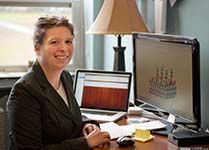 Professor Rachel Getman of Clemson University will be speaking to the CSR local section of AIChE about Simulations of Catalytic Activity under Aqueous Conditions at the Molecular Level using Quantum Chemical-Based Methods. The meeting will be held Thursday, April 10 at 6:00 pm at the Red Bowl in Aiken. Attendees will order off the menu.
Professor Rachel Getman of Clemson University will be speaking to the CSR local section of AIChE about Simulations of Catalytic Activity under Aqueous Conditions at the Molecular Level using Quantum Chemical-Based Methods. The meeting will be held Thursday, April 10 at 6:00 pm at the Red Bowl in Aiken. Attendees will order off the menu.
Biomass-derived hydrocarbons and alcohols can help our nation meet its increasing demand for energy, offset declining reserves of domestic petroleum, and avoid environmental harm caused by combusting fossil fuels, yet they are not widely employed because the catalysts used to create and extract energy from them are primitive. These catalysts are often comprised of precious metals like platinum, which are expensive, and which deactivate over time despite their inherent nobilities.
While the catalysis research community has exquisitely crafted active, selective, and robust materials for a number of reactions, design of catalysts for many alternative fuel applications is hindered because synthesis and processing often occurs under water, and the large density of water molecules near the catalytic surface obstructs experimental and computational attempts at watching the "molecular dances" that occur there during catalytic transformations. Elucidating molecular level phenomena in the presence of such complex reaction environments is critical to designing catalysts to operate in these environments.
There is thus a critical need to re-define methods for probing molecular-level chemistry that occurs under water. In the absence of such endeavors, the catalysis community cannot fully understand catalytic activity in aqueous phase or design new catalysts for aqueous phase transformations, and thus alternative fuels that rely on such conditions for synthesis or processing will not come to fruition. Our group focuses on computational approaches to catalyst design.
One of the biggest computational challenges is identifying the linkages between the reaction environment and the catalytic surface that control the kinetics of the relevant desired and undesired processes. In this work, we describe our preliminary efforts aimed at linking aqueous and surface phase chemical potentials under water for electrocatalyzed methanol oxidation. We find that presently used solvation models provide very different results and propose a method for more accurately modeling the water/catalyst interface. We go on to outline our future work aimed at designing catalysts atom-by-atom for superior activity, selectivity, and stability under water.
Rachel is an Assistant Professor specializing in Molecular Modeling, Heterogeneous Catalysis, and Rational Catalyst Design Education. She has a Ph.D. from the University of Notre Dame and a B.S. from Michigan Technological University. Rachel’s research involves using quantum and classical chemical modeling to understand chemical reaction pathways on solid catalysts. Specific areas of interest include understanding catalyst function, deriving reaction mechanisms, and optimizing catalyst composition using high throughput screening. She is especially interested in catalysts that employ transition metal active sites, such as extended metal surfaces, metal nanoparticles, and biomimetic metal containing systems. She uses molecular modeling to understand how these materials catalyze specific reactions and then derives catalyst-property relationships in order to predict optimal catalyst designs. Current research focuses on understanding both gas and aqueous phase catalysis. Rachel is interested in developing catalysts for biomass reforming, water purification, exhaust gas treatment, and other applications.
Please notify James Laurinat at James.Laurinat@srnl.doe.gov if you plan to attend.
- Log in to post comments
